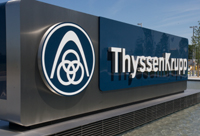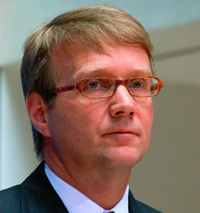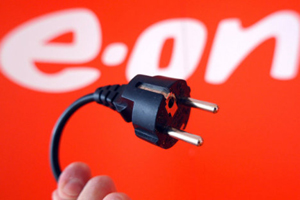VIPsight - February 2010
COMPANIES
First HV-AGM vote on executive remuneration
 Steel group ThyssenKrupp is the first German DAX group, following the entry iinto force of the new Act on Executive Remuneration in autumn 2009, to let its shareholders vote on the level of its board members’ remuneration, at the AGM on 21 January. With 99.55% in favour, shareholders voted for a salary cut for the board for the completed business year 2008–9 from €19.8 million to €6.5 million. Bonuses were deleted. The proposed dividend of €0.30 met with criticisms. In view of the enormous loses for the year this amount of €140 million was not justified, and would, said the critics, be paid in favour of the major shareholder, the Krupp von Bohlen und Halbach-Stiftung, out of assets. However, the distribution was resolved on by a majority.
Steel group ThyssenKrupp is the first German DAX group, following the entry iinto force of the new Act on Executive Remuneration in autumn 2009, to let its shareholders vote on the level of its board members’ remuneration, at the AGM on 21 January. With 99.55% in favour, shareholders voted for a salary cut for the board for the completed business year 2008–9 from €19.8 million to €6.5 million. Bonuses were deleted. The proposed dividend of €0.30 met with criticisms. In view of the enormous loses for the year this amount of €140 million was not justified, and would, said the critics, be paid in favour of the major shareholder, the Krupp von Bohlen und Halbach-Stiftung, out of assets. However, the distribution was resolved on by a majority.
While there was massive criticism at the AGM of the cost explosion in the construction of the two new plants in Brazil and the US, Der Spiegel reported that the group would get rid of its last involvement in merchant shipbuilding.bThe report stated that the traditional Hamburg dockyard Blohm + Voss, specialized inbbuilding luxury yachts and the repair and maintenance of merchant vessels, would have 80% of it sold to the Arab group of companies Abu Dhabi MAR. ThyssenKrupp would keep the remaining shares. Naval shipbuilding, with frigates and submarines, would however remain a core business.
Siemens too holds a vote on pay
At the Siemens AGM on 26 January too, the shareholders’ meeting was for the first time able to vote on management remuneration. Management was praised for this, but shareholder associations like the Deutsche Schutzvereinigung für Wertpapierbesitz (DSW) criticized the pay level of Siemens CEO Peter Löscher, which in 2009 was €7.1 million. There were also demands to extend the holding period for options granted from three years to four. Hans-Christian Hirt of the British pension fund Hermes noted that Supervisory Board remuneration was wrong because the variable part exceeded the fixed part and was linked to the result per share. In response to the critical voices, Supervisory Board chair Gerhard Cromme announced he would have the pay system reviewed once again to see whether it was in line with the new Act on Appropriateness of Executive Remuneration (VorstAG). The Supervisory Board meeting in April could then already decide on necessary changes, said its chair.
Hope for E.ON and RWE

The nuclear shut-down act passed by the red-green government in 2002 provided for the seventeen German nuclear power stations to be taken off the grid by 2022. The CDU is now talking openly about extending the lifetimes of the nuclear power stations. In mid-January the minister for the chancellery, Ronald Pofalla (CDU), invited the boards of the four big German energy suppliers and the secretaries of state from the ministries for the economy and the environment to come to him and discuss the future of nuclear power, reported Der Spiegel. The option being negotiated is to extend the lifetimes of the reactors and hand over at least half of the company’s additional gains from that to the federal government. The coalition could then use these to finance the transition to the green-power age. Landesbank Baden-Württemberg has calculated that if the nuclear power stations had their lifetimes extended by 25 years, at an electricity price of €80 per megawatt-hour the four electricity groups could earn up to €233 billion.
By the summer break the lifetimes and conditions for extending them should be clarified. This also includes the question of the additional nuclear waste that would then be produced. The matter will however be definitively settled only in autumn, when the government presents its announced overall energy-policy concept. The topic is a pressing one because the two reactors in Biblis and Neckarwestheim are soon to be taken off the grid. There are, however, also speculations now that the remaining power quantities established could be transferred from new reactors to old ones. That would affect the two utilities, RWE and E.ON.
Power struggle over Infineon
At the Infineon AGM, for the first time in the history of the Federal Republic of Germany minority shareholders want to replace the Supervisory Board chair candidate proposed by the Supervisory Board. Klaus Wucherer, ex board member of Siemens, was proposed by the departing Supervisory Board chair Max Dietrich Kley as his successor. Wucherer has been on the Supervisory Board for several years now. That meant he shared the responsibility for the bankruptcy of memory-chip subsidiary Qimonda and thus did not stand for the necessary new start, said Hermes fund manager Hans-Christoph Hirt in his criticism. The British pension fund put forward Willi Berchtold, present CFO of automotive supplier ZF Friedrichshafen, as a counter-candidate. The VorstAG act, in force since autumn 2009, allows direct election of individual Supervisory Board members. Hermes has in the meantime managed to win over proxy agent VIP (Vereinigung Institutioneller Privatanleger), voting consultancy Ivox, Riskmetrics and other institutional investors to his side. Wucherer suggested holding his post as Supervisory Board chair for one year only, so as then to make room for a “distinguished successor candidate” from outside.
Müller wants to overturn the remuneration limit
The government has saved Germany’s second biggest bank, Commerzbank, from a grave position, for altogether €18.2 billion. Rescue fund SoFFin alone supplied 16.4 billion as a silent contribution. As soon as the bank is out of the red, it must according to EU provisions pay interest of 9% on this contribution. However, losses are expected for 2010, too, so that the interest is not likely to become due until 2011. As long as the loss position continues, the salaries of top managers are limited to €500,000 a year. The ex CEO, now Supervisory Board chair, Klaus-Peter Müller, in January called on the federal government to lift this pay limit. In September 2009 Müller had still managed to come to agreement with the Soffin steering committee that the pay ceiling would be time-limited till 2009. However, the federal government has now rejected an appeal of the provision. Müller, who as head of the government commission is also responsible for working out new pay structures, based his demand on the ground that otherwise top bank personnel would move away.
Drugstore chain Müller moves into Douglas
At a little over 3%, entrepreneur Erwin Müller in November came into retail group Douglas, and has been buying up more since. At the same time, Swiss bank Sarasin also took a holding of some 10% in Douglas. Says Müller: “For myself I see the investment in the Douglas shares as already a second leg to stand on.” Particularly in procurement and logistics, the drugstore-chain owner hopes to secure synergies between the two companies. In particular, he could in future supply the perfume stores in the Douglas group, were his plans. Douglas is sceptical about his entry. Through Sarasin, Müller might possibly have access to a further 14%, admitted Douglas CEO Henning Kreke. While Douglas owners Oetker and Kreke were seeking defences against a hostile takeover, they nonetheless fear that Müller could, together with the credit institution, secure a blocking minority at the AGM. The hostile entry brought the Federal Financial Services Oversight Panel (BaFin) into play.
Porsche threatened by a special audit

At the Porsche AGM there was no vote on discharge to board members Wendelin Wiedeking and Holger Härter, in office until July. The company wants to await the outcome of investigations by public prosecutors who are looking back at the capitalmarket transactions that took place in connection with speculation in VW options. Christian Strenger, member of the German Corporate Governance Commission, in vain called as a private person for a special audit to clarify the conduct of the board and Supervisory Board. If Strenger subsequently manages to get 1% of the capital on his side, he can legally enforce this special audit. That would, according to the FAZ, block the integration of Porsche into the VW group for a year.
Subsidies to solar electricity to be cut
Federal environment minister Norbert Röttgen (CDU) presented a bill in January whereby the subsidies to solar and the “over-promotion” of the solar industry would be cut still more in 2010 than originally planned. Currently, the substitute to small solar installations on house roofs is 39 cents per kilowatt-hour, down from 43 cents the previous year. By 2011 subsidies to solar electricity are to be cut to up to 34%. That would mean a reduction by 13 cents to 26 cents per kilowatt-hour fed in. The cuts would particularly affect installations on agricultural set-aside land and old military and industrial sites. Particular promotion is however planned for solar cells on roofs used for home consumption and thus not fed expensively into the power grid. The industry association Bundesverband Solarwirtschaft expects job losses at companies like Solarworld, Phoenix Solar or Conergy, and is even talking about bankruptcies. The stock exchange reacted by bringing prices down by up to 25%. Röttgen by contrast sees a price fall for solar systems of 30%, and expects new installations in any case to be offered by 2013 at market prices, and therefore with no subsidies.
Pause for breath at Continental
 The merger of the two automotive suppliers Continental and Schaeffler has been postponed for the moment, reports Handelsblatt. The stock-exchange prospectus for the recent capital increase at MDAX group Continental definitively rules out the merger of the two in the next twelve months. Both firms will initially cooperate in the power-train sector, it is now said. This means that financial rehabilitation of the two struggling companies is being given priority over a merger. The capital increase of a billion Euros and 31 million shares needed to cut indebtedness was placed overwhelmingly with institutional investors. It was also announced that Continental shareholders could not expect any dividend until 2012. The capital increase is to be followed by a high-interest bond to cut indebtedness, at latest in the second quarter.
The merger of the two automotive suppliers Continental and Schaeffler has been postponed for the moment, reports Handelsblatt. The stock-exchange prospectus for the recent capital increase at MDAX group Continental definitively rules out the merger of the two in the next twelve months. Both firms will initially cooperate in the power-train sector, it is now said. This means that financial rehabilitation of the two struggling companies is being given priority over a merger. The capital increase of a billion Euros and 31 million shares needed to cut indebtedness was placed overwhelmingly with institutional investors. It was also announced that Continental shareholders could not expect any dividend until 2012. The capital increase is to be followed by a high-interest bond to cut indebtedness, at latest in the second quarter.
Schaeffler, itself €12 billion in debt because of taking over 90% of the Continental shares, agreed a restructuring of its debts in August 2009 with its creditor banks. The interest on the credit package will now be paid by the family firm from operative business. If possible by the third quarter of 2010, Schaeffler wants to transform itself into a joint-stock company. It is not clear whether its form will be as an AG or an GmbH. This step was a requirement for the merger of the two automotive suppliers. In the course of the latest Conti capital increase, the family firm’s share of the Hanover group was down from 90% of the shares to 75.1%.
E.ON hives off its grid
 Earlier than planned, energy company E.ON will hive off its some 11,000km long power grid, retroactively to the beginning of the year. According to Financial Times Deutschland, the group is expecting the permits from the authorities by the end of January. Initially, the transaction had been announced for the first quarter of 2010, but it could now be earlier. The transaction will bring E.ON some 1 billion euros. With the sale to Dutch grid operator Tennet, the electricity company is meeting a requirement from the European Commission, which had demanded in order to promote competition that E.ON should get rid of its high-voltage grid. In the course of restructuring, the French EDF group and E.ON competitor ENBW also gave up capacity, or acquired new capacity. Altogether, once the exchange is completed E.ON will, as well as its power grid, have transferred 5,000 MW of power-station capacity.
Earlier than planned, energy company E.ON will hive off its some 11,000km long power grid, retroactively to the beginning of the year. According to Financial Times Deutschland, the group is expecting the permits from the authorities by the end of January. Initially, the transaction had been announced for the first quarter of 2010, but it could now be earlier. The transaction will bring E.ON some 1 billion euros. With the sale to Dutch grid operator Tennet, the electricity company is meeting a requirement from the European Commission, which had demanded in order to promote competition that E.ON should get rid of its high-voltage grid. In the course of restructuring, the French EDF group and E.ON competitor ENBW also gave up capacity, or acquired new capacity. Altogether, once the exchange is completed E.ON will, as well as its power grid, have transferred 5,000 MW of power-station capacity.
Permira hives off Freenet
Investment company Permira has got rid of the bulk of its holding in Freenet. For its 12.9 million shares Permira got some 115 million euros. The holding of Permira subsidiary Telco in Freenet fell from 24.99% to 10.1%. Placement of the 19.1 million Freenet shares was carried through by Goldman Sachs and UBS in an accelerated bookbuilding procedure. After the sale of Debitel to Freenet and the change at the top, it was the right time to get out, stated Permira. The financial investor had come into Freenet last year when then Freenet CEO Eckhard Spoerr bought its competitor Debitel. United Internet and financial investor Cyrte had also recently sold shares in Freenet.
Frenzel blocks Fredriksen
The TUI board will after the AGM on 17 February be cut by one member, to four. CFO Rainer Feuerhake is retiring and will not be replaced. The composition of the TUI Supervisory Board continues to be controversial. Since his entry to the Hanover group, Norwegian shipowner John Frederiksen has been fighting to have two seats on the oversight body. Frenzel had offered Frederiksen one seat on the Supervisory Board, but linked to a condition that neither Frederiksen nor his confidant Tor Olav Troim would join it. Since Troim had thought aloud about founding a cheap container line, the regional court in Hanover found that a possible conflict of interests would threaten if Troim held a post on the TUI Supervisory Board, so that his application to join it was rejected. Thanks to the latterly evident improvement in business, shipowners Hapag-Lloyd are hoping not to have to use the State guarantee of 1.2 billion euros they negotiated in autumn. European transport commissioner Antonio Tajani had approved the State aid to the former TUI subsidiary.
However, new competition commissioner-designate Joaquin Almunia might now call the aid in question, “since it is not exactly minor aid”. Only €500,000 can be given to a company by an EU country – on condition that the company given the aid must have been sound before the crisis. Additionally, the aid must not exceed the staff costs of the firm receiving it. In the case of Hapag- Lloyd the aid was ten times these costs, so that the shipowners had to pay the State almost as much interest as on the free market for the guarantee. On the ownership side too there are changes to be seen. Majority owner TUI will in the long term move entirely out of the shipowning business and get rid of its Hapag holdings of 43%. As from 2012 the tour operator has arranged a purchase option for them with the owner syndicate around shipper Klaus-Michael Kühne and Albert Ballin. Kühne has now said that TUI might even gradually withdraw earlier from its involvement. It would then be conceivable for private-equity houses to come on board as new investors.
Rheinmetall and MAN to co-operate
Technology group Rheinmetal and utilityvehicle maker MAN have decided in an agreement to cooperate in the area of wheeled military vehicles. The two groups are – assuming antitrust authorities accept – founding Rheinmetall Man Military Vehicles GmbH (RMMV), with its headquarters
in Munich, in which Rheinmetal will hold 51% and MAN 49% of the shares. It is intended to move forward to become an important complete supplier of wheeled military vehicles. The range will include armoured and nonarmoured transport and staff and functional vehicles. In a first stage, development and distribution operations of both companies in the area of wheeled military vehicles will be brought together under the umbrella of the new company. In a second stage, by 2011, production capacity at the Kassel and Vienna works is to be integrated into the joint venture. RMMV will employ 1,300 workers and have an estimated turnover over 1 billion euros.
Is Metro threatened with an antitrust fine?
In the German food-retail trade there have been price agreements among suppliers and producers, is the suspicion the German antitrust watchdog Kartellamt is now following up. In mid-January a hundred investigators and police had made raids on 15 suspect firms and manufacturers, including wholesaler Metro. Branded-article producers are said to have agreed prices for sweets, coffee and animal feed with the retailers. If the accusations of an illegal cartel should prove true, the companies involved are threatened with fines that might amount to up to 10% of annual turnover. In late 2009 the Kartellamt imposed a fine of €159.5 billion on the three biggest German coffee-roasters for anticompetitive price agreements.















